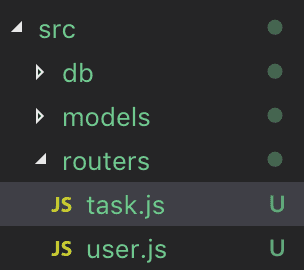Nailer's blog
Node-RESTful API (2)
March 23rd, 2019
 일단 지난 포스팅에서 다뤘던 async/await을 활용하여 실습 프로젝트를 수정하면
일단 지난 포스팅에서 다뤘던 async/await을 활용하여 실습 프로젝트를 수정하면
app.post('/users', async (req, res) => {
const user = new User(req.body)
try {
await user.save()
res.status(201).send(user)
} catch(error) {
res.status(400).send()
}
})이와 같이 간결하게 고칠 수 있다.
Resource Updating Endpoint
Updating a User
app.patch('/users/:id', async (req, res) => {
const updates = Object.keys(req.body)
const allowedUpdates = ['name', 'email', 'password', 'age' ]
const isValidOperation = updates.every(update => allowedUpdates.includes(update))
if(!isValidOperation) {
return res.status(400).send({ error: 'Invailid Updates' })
}
try {
const user = await User.findByIdAndUpdate(req.params.id, req.body, { new: true, runValidators: true })
if (!user) {
return res.status(404).send()
}
res.status(202).send(user)
} catch (error) {
res.status(400).send(error)
}
})const updates = Object.keys(req.body)
**Object.keys()**는 object에서 key값들에 대응하는 문자열들을 요소로 갖는 배열을 반환한다. 반환된 요소는 loop문을 실행할 때 주어지는 순서와 동일하다.
const isValidOperation = updates.every(update => allowedUpdates.includes(update))
Array.prototype.every()
The every() method tests whether all elements in the array pass the test implemented by the provided function. (전부 true일 경우에만 true)
위에서 사용한 두 가지 옵션 new와 runValidators는
new: bool - if true, return the modified document rather than the original. defaults to false (option이 없을 때는 original document를 ruturn했음)runValidators: if true, runs update validators on this command. Update validators validate the update operation against the model's schema.
Resource Deletion Endpoint
app.delete('/users/:id', async (req, res) => {
try {
const user = await User.findByIdAndDelete(req.params.id)
if(!user) {
res.status(404).send()
}
res.status(200).send(user)
} catch (error) {
res.status(500).send()
}
})user가 없을경우 404 not found로 처리
error일 경우 500 internal server error 코드를 보내준다.
비교적 간단한 코드로 해낼 수 있다.
이러한 모든 요청들을 index.js 하나의 파일에 그 처리를 작성하면 유지보수를 하기 어렵다.
그래서 express.Router를 활용해서 refactoring을 진행한다.
깔끔해진 index.js
const express = require('express')
require('./db/mongoose')
const userRouter = require('./routers/user')
const taskRouter = require('./routers/task')
const app = express()
const port = process.env.PORT || 3000
app.use(express.json()) // json을 자동으로 parse해준다.
app.use(userRouter)
app.use(taskRouter)
app.listen(port, () => {
console.log('Server is up on port ' + port)
})

routers 폴더안에 정리하고
const express = require('express')
const router = new express.Router()
const User = require('../models/user')
router.get('/test', (req, res) => {
res.send('This is user.js test')
})이러한 방식으로 정리하면 된다.